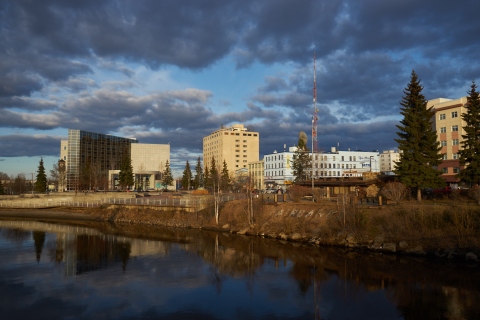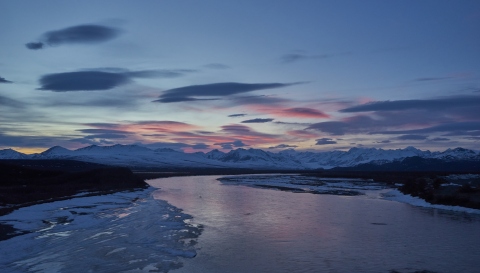Alaskan Tales: #4: The Midnight Sun
I woke to birds singing. Sunlight was streaming through the window of my tent.
I should get up. I thought groggily, struggling out of my sleeping bag into the bitter cold of the morning. Wait. My one conscious brain cell interjected. I should check what time it is first. I held my watch up to the window. 3:40am. Right. Bugger that, I’m going back to sleep.
I collapsed back onto my bed roll, pulled my sleeping bag over my face, and went back to sleep. When I next woke up, birds were still singing, sunlight was still streaming in through the window of my tent, but it was 11am. I sighed.
I think it’s safe to say, I was having trouble adjusting to Alaska’s midnight sun.
I’d always been fascinated by the idea of the midnight sun. Was there really a time and place without night? Could you be so close to the poles that the day would last for weeks? The rising and setting of the sun seemed to be one of the few constant, immutable things in life, but, well, maybe, not really?
Arriving in Alaska in spring, we didn’t notice much difference at first; sure the days were longer, but nothing more extreme than in Vancouver around the solstice. Soon, however, the northern latitude began to make itself felt. Suddenly, we had no need of our torches and headlamps when camping, the sun began setting around 7pm, and stayed that way for hours. Once the sun had finally fallen below the horizon, a long-lasting twilight persisted until well after we’d gone to bed. By the time we woke up, the sun had already risen.*
Beyond the 60th parallel, the sunset grew later by seven minutes every day. In Fairbanks, we strolled along the Chenna river at 11pm, enjoying the languid sunset of the far north.
Oddly enough, Alaska has Daylight Saving Time. This seems a little unnecessary. If your sun doesn’t set until after midnight, you probably don’t need to be frugal with your daylight hours.
I coped with it well for the first few weeks. The evenings were still so cold that I was my tent by midnight, snugging down into my sleeping bag, pulling it over my head to trap as much warmth as possible. I assumed it got dark at some point during the night, but I was never awake to see it.
Then, one night it all went horribly wrong. I was curious as to when it really did get dark, so I decided I would stay up until the night came.
This was a silly mistake.
At 2am, I gave up. The sun had started setting hours ago, but apparently saw something shiny along the way and got distracted, barely making it to the horizon. Now the world was slowly growing light again; the sky was bright, and everything was a washed out grey. It reminded me of coming home after a long night in the pre-dawn netherworld between night and day.
Except that it was 2am and I was still waiting for it to actually be night before it got to be day again.
Giving up, I went to bed. I lay in my sleeping bag and watched the small window of my tent get lighter and lighter. Shortly afterwards, a bird next to my campground started singing.
At this point, my body clock just gave up and went on a holiday all of its own.
Over the next few nights, I found myself staying awake later and later, unable to asleep as my body stubbornly insisted that nope, daylight is not sleeping time. For a while I kept trying to get my body clock back on schedule, but it just stopped returning my calls.
Fortunately, I wasn’t the only one. A lot of other campers were having their own problems adjusting to the constant sunlight; some, like myself, were unable to fall asleep, while others woke up at 3am and couldn’t get back to sleep. It was Alaskan jet lag.
Even the locals weren’t immune. Homes in Alaska come with blackout curtains, and people try to stick to a regular schedule through the summer months to avoid this sort of thing, but I still heard stories of people getting up to make coffee at 4am, or accidentally going out fishing at midnight.
I got the impression that calling in late to work because you lost track of time is the Alaskan equivalent of “stuck in traffic”.
Eventually I decided to just roll with it. After all, I was on holiday, and the light was endless. So what if I didn’t start hiking until 3pm? It wasn’t as if I had a shortage of daylight to make it back in. The animals were also on a longer time frame, often snoozing away the warmer middle of the day before coming out in the evenings. Even the shops were open until late in the evening; summer is a busy time in a state that shuts down for half of the year.
I slept when I was tired, and ate when I was hungry. I didn’t bother about looking at my watch to see if I was having dinner at 6pm or 11pm – it made no difference. After a while, I couldn’t even find my watch.
But, as difficult as it was to adjust to, I was enjoying the strangeness of the midnight sun. It was every bit as otherworldly and magical as I had always imagined it to be. There was something utterly enchanting about sitting by a campfire at midnight, while birds sang, and squirrels chattered amongst the trees.
Eventually, my time in Alaska grew to an end. Rather than drive the same route back to Vancouver, I decided to take the ferry home. From south-east Alaska, the ferry heads due south for two days, before arriving in the BC port of Prince Rupert. You could either rent a cabin, or do as the locals do, and camp out on the back deck. I decided to camp.
That night, as we steamed south, the sun finally sank below the horizon. I unrolled my sleeping bag onto the deck and looked up at the dark sky, watching as the first stars in three weeks appeared, and night stole over the land. I was sad to leave the midnight sun, that endless day that is summer in Alaska, but I did have a new appreciation for night and regular sleeping patterns.
*Although that may be more because of our sleep patterns than Alaska’s daylight hours.


Leave a comment